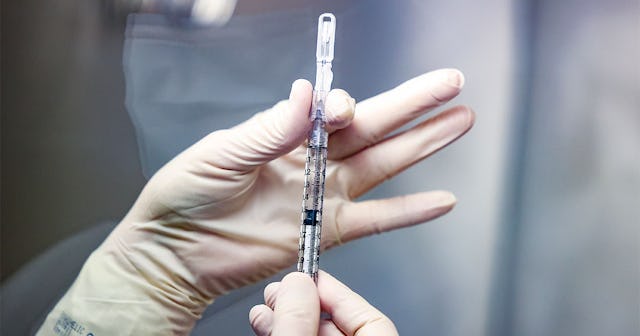New Research Shows Breakthrough COVID Infections Are Very Rare

A new study of more than a million vaccinated people found that the chance of developing a breakthrough COVID infection is very rare
As COVID cases continue to rise nationwide amid seemingly worrying information about new variants — along with an unnecessarily politicized countrywide debate over whether or not masks and vaccines are lifesaving tools for people of all ages — it’s understandable if you’re feeling worried about contracting the virus, even if you are fully vaccinated.
One new study should help put you at ease just a bit, with the results seemingly showing that vaccines continue to offer strong protection against severe illness and hospitalization. The research, which was published yesterday in The Lancet Infectious Diseases, an independent medical journal, was conducted in the U.K. between December 2020 and July 2021.
Researchers collected data from more than 1 million people during this time period, which spanned both the alpha (aka the original SARS-CoV-2 virus strain) and delta variant waves in the U.K. Participants in the study had received two doses of either the Pfizer-BioNTech, Moderna, or AstraZeneca vaccine, providing self-reported data of either a positive COVID-19 test at least 14 days after their first vaccination (but before their second) or a positive test at least 7 days after their second vaccination; with no positive test before they received their first dose.
Ready to breathe a bit easier? The findings illustrated that 6,030 participants tested positive for COVID after their first dose, and 2,370 tested positive after their second dose. If that sounds like a lot, know that the numbers work out to less 0.5 percent and 0.2 percent, respectively.
Other promising news: The study found that when breakthrough infections did occur, the vast majority of participants reported no symptoms at all — just six percent of people with breakthrough infections reported symptoms. Still, given what we know about fully vaccinated folks and the ability to spread the virus, being asymptomatic means you might not realize you’re at risk for passing it along to someone else who is not yet fully vaccinated.
Along with most breakthrough infections producing little to mild symptoms, the study found that being fully vaccinated lowered the risk of hospitalization by more than two-thirds, and the risk of developing long-haul symptoms were cut in half.
Even better news: Two additional studies published the same day looked at the link between breakthrough infections in healthcare workers, finding a similarly low risk among the fully vaccinated.
A study published in JAMA Network Open, analyzed breakthrough infections among more than 5,300 vaccinated health care workers in Israel between January 1 and March 31 of this year. The results found 27 infections, which is slightly above .5 percent. No deaths were reported, and one fully vaccinated patient was hospitalized. Of course, it’s worth noting that this research was conducted prior to the Delta variant’s arrival in Israel.
The third study, which published in the New England Journal of Medicine, found 94 symptomatic breakthrough infections out of more than 16,000 health care workers between March and July, as the Delta variant took hold in the U.S. Note that breakthrough infections did increase over time, which calls to attention fears that current vaccines will wane in efficacy from protection against Delta and other variants.
All that said, the best — and most important — way to protect yourself and your loved ones and help to end the pandemic once and for all is to get vaccinated as soon as you’re able to, and receive a booster as soon as you’re eligible. There’s truly no other option at this point.